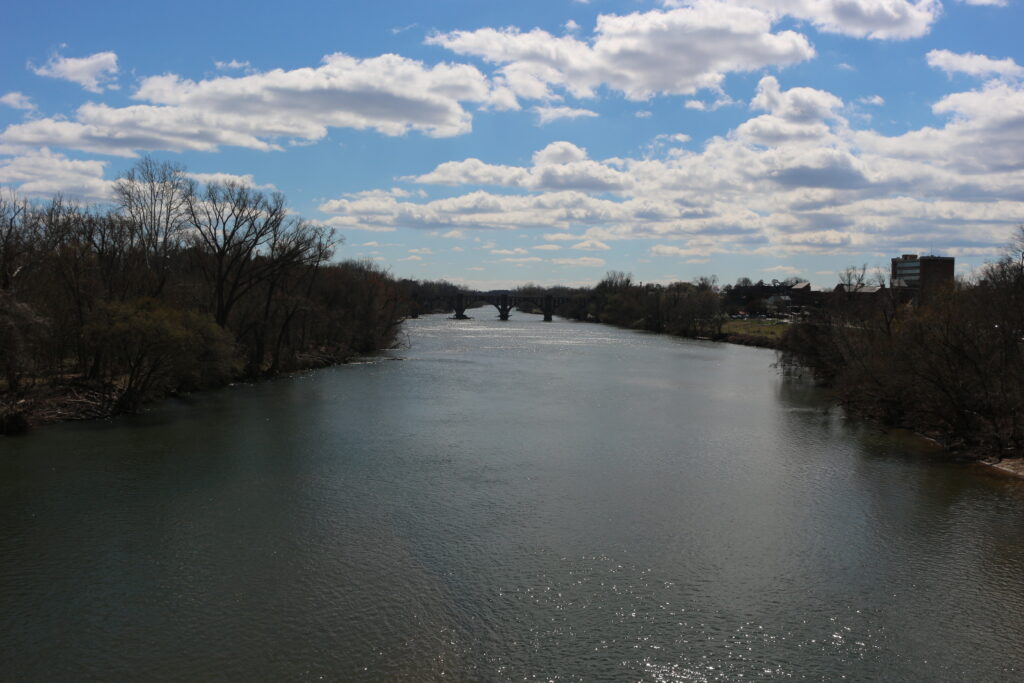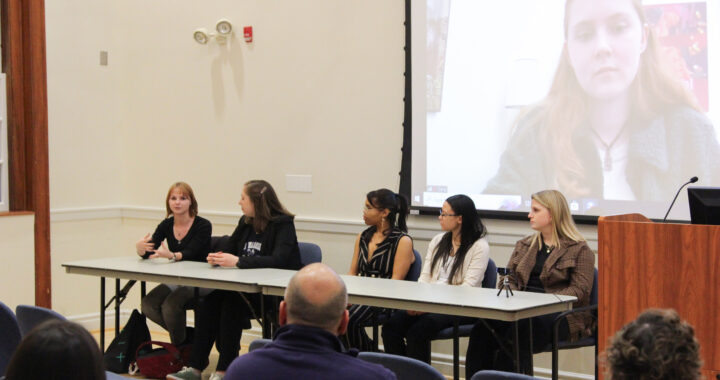Professors weigh in on Virginia’s potential withdrawal from the Regional Greenhouse Gas Initiative
4 min read
The Rappahannock River on a sunny day in downtown Fredericksburg. | Russell Carver, The Weekly Ringer
by RACHEL FRANTZ
Staff Writer
Through March 31, the Virginia State Air Pollution Control Board is holding a public comment period where Virginians can present thoughts regarding the state’s proposed withdrawal from the Regional Greenhouse Gas Initiative. UMW faculty and staff members who specialize in environmental sustainability weighed in on the issue.
According to 13NewsNow, the initiative, which Virginia joined in 2020, currently limits power plants’ emissions of carbon dioxide in Virginia and the 10 other participating states in the Northeast.
“It’s a really great program … I only have good things to say about it,” said Melanie Szulczewski, associate professor of Earth and environmental sciences. She has been teaching about climate change for nearly 20 years and has been involved in many climate activism initiatives.
“When Virginia joined much later than many of the other states in 2020 through a law from the general assembly, it was exciting news,” she said. “They joined even before President Biden’s pledge to reduce the nation’s greenhouse gas emissions by 2030, and so this was a great jump start for Virginia to participate.”
UMW Earth and environmental science Assistant Professor Pamela Grothe believes in the value of the initiative as well.
“It really sends a message to our neighbors that we are serious about reducing dangerous greenhouse gas emissions,” said Grothe. “Many of our UMW students are from coastal Virginia and I’ve heard their stories firsthand on how they’ve personally been affected by excessive flooding due to higher sea levels and extreme rainfall events.”
The Regional Greenhouse Gas Initiative, Grothe said, has provided “over $30 million to the Virginia Community Flood Preparedness Fund to build resilience to climate-related flooding, and a quarter of this must go to low-income communities.” By pulling out of the initiative, Virginia could lose this funding.
“This is besides from the most obvious fact that RGGI is a proven way to reduce our state’s greenhouse gas emissions to help avoid the most catastrophic climate impacts that Fredericksburg is not immune to,” Grothe said. “By leaving RGGI, we move in the wrong direction in making significant strides to reducing carbon emissions.”
UMW Sustainability Coordinator Sean Morrow also shared his disappointment in the potential fall of the initiative.
“RGGI was a strongly positive initiative that provided direct clarity to a long history of market-based climate initiative and discussion,” he said. “The initiative has provided a clear path forward for Virginia’s clean energy development without sacrificing resiliency and environmental justice. The proof of RGGI’s benefit has been shown already—VA has collected over $500 million of revenue from RGGI that directly benefit clean energy and resiliency projects in low-income areas.”
According to Morrow, withdrawing from the initiative will negatively impact low-income communities across the state.
“It’s been shown that more than 60 percent of RGGI generated revenue goes to support low income communities in Virginia who are disproportionately affected by climate change,” he said. “Without Virginia’s involvement, we are losing access to funding available to support these local resiliency projects.”
Szulczewski also expects negative effects of the possible withdrawal.
“First of all, air pollution still exists, right?” she said. “And that affects many people, not just those with asthma, but there are long-term cardiopulmonary impacts on people—we know that the increases in strokes, heart disease, many other issues come from long-term exposure to excessive breathing of nitrous oxides and sulfur dioxide and VOCs and other emissions, so it can impact the health of the UMW community directly.”
The initiative is partially modeled after the sulfur dioxide cap-and-trade from the 1980s–1990s to combat acid rain, “which was very successful and reduced sulfur emissions quicker and less expensively than anyone had ever predicted,” Szulczewski said. The current initiative “is called cap-and-invest, which is even better because the money goes back to the people of the states where the power companies are paying for the allowances to emit carbon dioxide and greenhouse gasses.”
Withdrawing from the initiative could also mean more harsh floods and storms close to home in Fredericksburg.
“45% of all of the funds that have come back to Virginia from the payments for the emissions allowances have gone to flood preparation funds, to help with flooding,” Szulczewski said. “Fredericksburg may not be first on the list that’s going to suffer from flooding like the whole Virginia Beach area and anything near Chesapeake Bay, but the Rappahannock is a tidal river and it certainly is going to increase flooding events. If you look at a map of potential flooding, downtown Fredericksburg is greatly impacted.”
The public comment forum, open for anyone to comment until the end of the month, currently has many comments supporting the initiative.











